The influx of foreign investors has sparked a notable boom in the Portuguese real estate market. With year-round sunshine, excellent living standards, top-notch cuisine, and high-quality healthcare and education, it’s no wonder international families and expats are flocking to buy property here.
The great news is that foreigners enjoy the same rights as Portuguese citizens when buying and owning property in Portugal. There are no legal restrictions based on nationality so you can purchase land, apartments, houses, and commercial properties just like a local.
In this ultimate guide to buying property in Portugal, you’ll get all the insights and information needed to make your real estate purchase confidently and easily.
You’ll also find out about:
Why buy property in Portugal?
Portugal has become the top choice for real estate investors, and for good reason. Here’s why the Portuguese real estate market is an attractive and profitable investment opportunity:
Ten reasons to purchase real estate in Portugal
- Enjoy a growing and stable economy that’s perfect for investment.
- Find your dream home where the sun shines year-round, making the property market even more attractive.
- With one of the lowest costs of living in Europe, Portugal offers great value for property purchase and investment.
- Property investment has high rental yields.
- Portugal is a safe place to live, with a high level of political stability
- Portugal is a beautiful country with unspoiled nature and beautiful beaches
- Portugal provides an exceptional quality of life, making its real estate market highly desirable for buyers and investors.
- The strong sense of community and family-friendly environment makes purchasing in Portugal even more appealing for families
- Portugal is easily accessible from Europe, Africa, and the US
- Robust public infrastructure, including healthcare and transportation, supports a thriving real estate market and enhances the property purchase experience.
Can foreigners buy property in Portugal?
Yes, you can buy property in Portugal as a foreigner. The process is generally straightforward, and there are no restrictions on foreign ownership. However, it is essential to understand the steps involved, the legal requirements, and the associated costs. This includes obtaining a Portuguese tax number (NIF), potentially securing financing, and navigating the legal and administrative steps necessary for a property purchase.
Foreigners can purchase various properties in Portugal, including residential homes, commercial spaces, land, and investment properties. They can also conduct seamless property searches and assess property values using the country’s straightforward process.
Also, you do not need to have permanent residence status or hold Portuguese citizenship to buy property in Portugal. You don’t even live in the country, as non-residents are allowed to own real estate, and there are no restrictions based on nationality.
Can Americans buy property in Portugal?
Yes, US citizens can buy property in Portugal. There are no restrictions on foreign property ownership in Portugal. The Portuguese government encourages foreign ownership of property in Portugal. You will, however, need to have a Portuguese NIF number. If you would like to stay in the country for more than three months, you will need to have the appropriate residency to stay in the country.
Can the British buy property in Portugal?
Yes, there are no restrictions on British citizens purchasing property in Portugal. If you would like to stay in the country for more than three months, you will need to have the appropriate residency to stay in the country.
Portuguese Real Estate Market Overview
Property Prices in Portugal
In the following section, we present a detailed overview of property prices across various regions in Portugal. The tabulated data provides a clear snapshot of current market trends, offering insights into average costs and regional variations to help guide potential buyers and investors in their decision-making process.
District | City | Average Price per m2 |
Baixa and Chiado | Lisbon | €7,79 |
Lapa and Santos | Lisbon | €5,94 |
Campo de Ourique | Lison | €5,20 |
Ribeira, Miragaia and Baixa | Porto | €4,54 |
Alfama | Lisbon | €5,94 |
Portimão | Algarve | €2,56 |
Cascais and Estoril | Cascais | €4,72 |
Carcavelos and Parede | Cascais | €3,80 |
In recent years, the Portuguese real estate market has become increasingly popular among foreign investment enthusiasts, especially among investors from abroad. This rise in foreign investment in Portugal’s property sector is largely due to properties being relatively cheaper than in other parts of Europe.
What are property prices like in Portugal?
Due to demand from foreign buyers and investors, Portuguese property prices are generally on the rise, particularly in popular areas like Lisbon, Porto, and the Algarve. Prices in Lisbon have surged significantly and are much higher compared to other parts of the country. Analysts predict that property prices will continue to increase shortly.
Which are the most expensive areas for purchasing property in Portugal?
Lisbon and the Algarve are by far the most expensive areas to buy property in Portugal. Setúbal, near Lisbon, can also be quite pricey, while in the Algarve, locations such as Lagos, Albufeira, Tavira, and Lagoa tend to have higher property prices. For luxury houses and apartments, Vale do Lobo, Quinta do Lago, and Vilamoura are among the top choices in the Algarve. For the best guidance, consult local real estate professionals to navigate these markets effectively.
Which areas are cheaper?
For cheap homes for sale in Portugal and great bargains, you should head inland, particularly in the central region of Portugal, such as Santarem, Viseu, Leiria, and Castelo Branco. An added advantage is that many houses and land in these areas are quite large and spacious. The Silver Coast is also an appealing option for those looking for reasonably priced properties, with relatively cheap houses available near the beach. It’s considered by many to be a good alternative to the Algarve, offering beautiful coastlines as well. To explore these options thoroughly, consult local real estate professionals.
Types of Property in Portugal
Portugal’s real estate market is flourishing, offering an array of property types. Whether you’re looking to buy in Portugal or just exploring, you’ll discover an abundance of options to find your dream home in the country
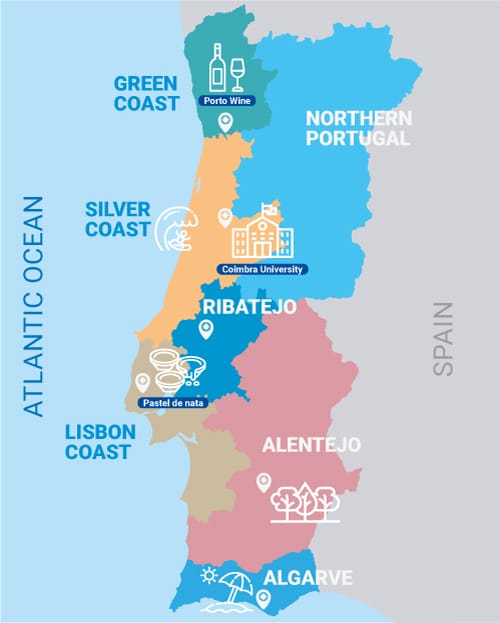
There are many different types of homes for sale in Portugal. However, when it comes to buying property in Portugal, you’ll encounter various terms that you might need to get accustomed to.
In the following section, we’ll provide you with clear definitions of these terms to help you navigate your property search with confidence.
- A casa or a moradia refers to a typical detached home, with some houses having a backyard or a patio and most having a wall around them with a front gate.
- A casa geminada simply means a semi-detached house.
- Condomínios or condos are individual apartment units with common spaces. These can be expensive because they come with a monthly condo fee but offer a premium standard of care and safety in return. Many have swimming pools, gyms, etc.
- Quintas are timeless rustic houses or farms. They’re usually located more inland, although some can be found in bustling suburban areas.
- Terreno means “land” in English. Some expats choose to buy a plot of land and build their own homes. If you go this route, it’s a good idea to check with the city hall (Câmara Municipal) to make sure the land is registered for residential use rather than agricultural purposes.
Apartment terminology in Portugal
When looking for a new home, you might come across ads with terms like ‘T0, T1, T2’, etc. These indicate the number of rooms in a property—a T1, for example, is a one-bedroom apartment, while T0 refers to a studio apartment. In the local market, some of the more luxurious properties in Portugal come with amenities like swimming pools, extra security, or private gyms, which can increase the price.
Where to Buy Property in Portugal
Portugal offers a variety of locations for buying property, and the ideal spot for you will depend on your budget and the type of property you’re after. Start by determining what you’re looking for and which area of Portugal appeals to you. Each region has its unique charm and benefits. Here are some places to consider when searching for your dream property:
Property in Lisbon
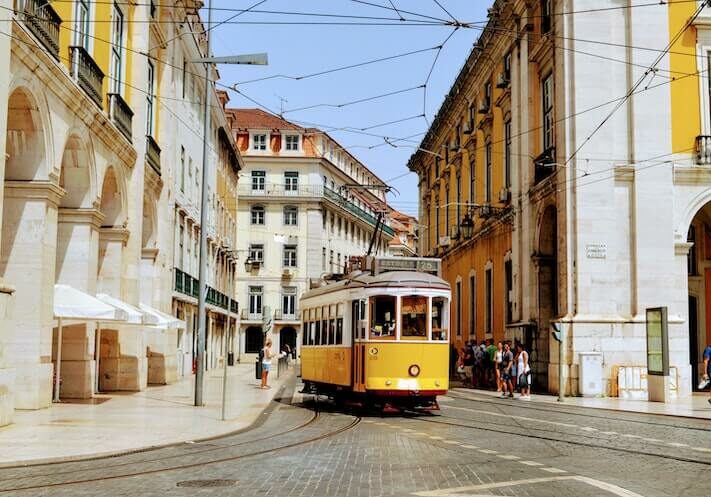
However, keep in mind that property prices in Lisbon have surged recently, making it quite pricey compared to other parts of the country. While this rise in property prices may seem steep, it also means that property value is increasing, which can be a significant advantage for investors looking to benefit from long-term gains.
The most expensive areas in Lisbon include Avenida da Liberdade, Baixa, Chiado, and Lapa. For more affordable properties at reasonable prices, consider areas like Benfica and Amadora.
Cascais and Estoril are also excellent alternatives to buying property within the Lisbon metropolitan area. Located just a 30 to 40-minute drive from Lisbon, these areas offer a charming coastal lifestyle. While real estate prices here are gradually increasing and can be high in certain spots, they still provide great value for money. Additionally, Oeiras, situated between Lisbon and Cascais, is another solid option. For more information, see our guide on where to buy property in Lisbon.
Property in the Algarve
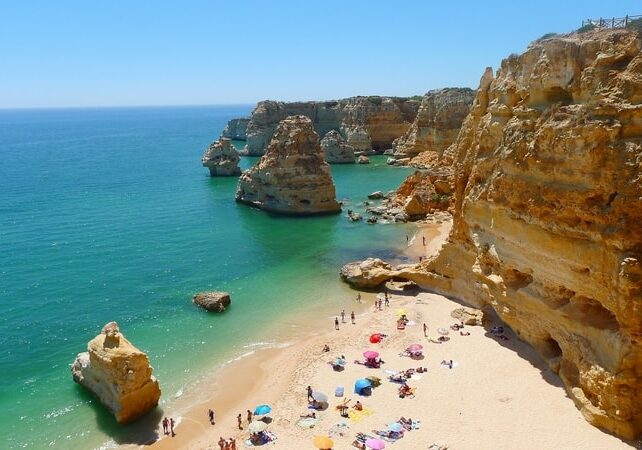
With easy flights to and from the UK, it’s no wonder that many English-speaking homeowners have holiday homes, villas, and beach houses here. Owning property in the Algarve means enjoying life in one of Europe’s most picturesque regions.
Property prices in the Algarve can vary significantly depending on the region. For instance, Vilamoura is renowned for its luxury homes, making it one of the priciest areas in which to buy property in the Algarve. Lagos and Albufeira are also on the higher end of the price spectrum.
If you’re seeking cheaper properties, consider areas like Monchique and Alcoutim or more rural regions for better deals.
Property in Porto
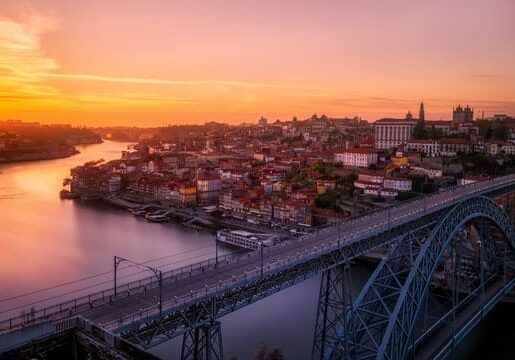
The real estate market in Porto is thriving, making it a great place to buy property in Portugal. With real estate prices on the rise in the Algarve and Lisbon, buying property in Porto is becoming an attractive investment option. Porto’s status as both a commercial hub and a tourist destination, coupled with its large student population, adds to its appeal.
In Porto, you’ll find various types of property to choose from. For instance, properties in Foz do Douro offer lovely views of the Atlantic, while Vila do Conde is an emerging area where you can still find excellent deals. Offering scenic vistas of the Luís I Bridge, Vila Nova de Gaia, and Ribeira neighborhoods are also worth considering, especially if you’re looking for commercial opportunities.
To learn more, check out buy property in Porto guide.
Property in Cascais
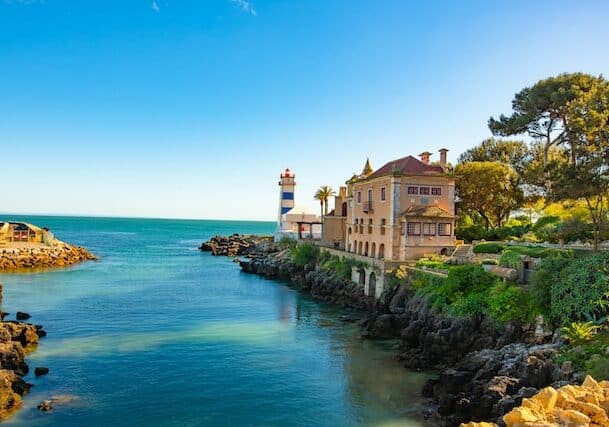
This appeal is partly due to its relaxed atmosphere, charming architecture, free museums, and well-kept parks. Located by the coast, it also provides access to stunning beaches and excellent amenities.
To find out more, check out our guide on where to buy property in Cascais.
Property on the Silver Coast
When you think of beautiful coastlines and beaches in Portugal, the Algarve often comes to mind first, and rightly so. However, the Silver Coast, situated between Lisbon and Porto, offers an equally stunning coastline, but it is sometimes overlooked. It’s roughly an hour’s drive from Lisbon, depending on your location on the Silver Coast.
This wonderful part of Portugal is an excellent alternative to the Algarve for buying a home by the beach, as property prices are generally lower. Consider places like Óbidos, Peniche, and Nazaré. For the best options and advice, consult local real estate professionals.
Property specialists
Looking to Secure Your Dream Property in Portugal? Get in touch with our real estate division, Goldcrest Real Estate - Portugal´s buyer's agent, to kickstart your property search in Portugal.
As the first buyer’s agent in Portugal, Goldcrest has a clear understanding of the local market and has helped hundreds of people find their ideal property.
Working solely on behalf of the buyer, they secure the best price for you, saving you time and hassle.

Where to Look When Buying Property in Portugal
There are many online portals and real estate agencies that advertise properties for sale in Portugal.
Some of them are:
Real estate agents can play a crucial role in your property search. Estate agent fees, typically ranging from 3 to 5 percent of the sale price, are usually covered by the seller. Since the real estate agent earns a commission based on the sale price, their goal is to secure the highest price possible, which could lead to an inflated asking price. As a buyer, be aware of this potential for higher prices and consider some negotiation room when evaluating an offer.
Alternatively, working with a buyer’s agent can be a strategic move. A buyer’s agent often has access to properties in Portugal that are not listed on the general real estate market and may be able to secure better prices. This can be advantageous for finding a property and achieving a successful property purchase while possibly obtaining a better deal.
Required Documents to Buy Property in Portugal
What documents do I need to buy property in Portugal?
- A passport
- Portuguese tax number (NIF)
Getting a Portuguese tax number
To enter the property market and purchase property in Portugal, whether as a resident or non-resident, you will need to have a Portuguese tax number (NIF), also known as the tax identification number. This tax number is crucial for buying property in Portugal and for opening a bank account.
If you’re a resident of Portugal, you can obtain this tax number at any local tax office (Finanças). You’ll need to provide proof of your address and passport to get your NIF. For non-residents or those not from the EU, you must appoint a fiscal representative to apply for the NIF on your behalf. Additionally, be aware of property taxes and immovable property tax in Portugal, which are important to consider when purchasing property.
Means of identification
To buy property in Portugal, you will need to provide proper identification. This can either be a passport or a Portuguese ID card (Cartão de Cidadão).
Opening Portuguese bank account
Opening a Portuguese bank account is advisable when buying a property to avoid dealing with frequent changes in the exchange rate.
Step by Step: How to Buy Property in Portugal
To buy a house in Portugal, first, get a Portuguese NIF number (tax ID), then open a Portuguese bank account. You’ll then need to find a property, which can be done with a real estate agent, before making an offer and signing a promissory contract with a deposit. Hiring a lawyer for due diligence is recommended before signing the final deed of sale and paying the remaining balance and taxes, such as IMT.
Here’s a quick breakdown of the steps you’ll need to follow to successfully buy a property in Portugal:
- Step 1: Work out whether you want to take a mortgage and what plan works for you when purchasing property.
- Step 2: Try and negotiate the price with the seller
- Step 3: When the price is agreed upon, you’ll need to make a down payment
- Step 4: Sign a Contrato-Promessa De Compra e Venda
- Step 5: Sign and notarize the property deed or Escritura Publica De Compra e Venda
The property purchasing process
Once you’ve settled on a price with the seller, you’ll need to complete the purchase. To finalize the purchase of a property in Portugal, follow these steps to wrap up the purchase process:
- Step one – Involve a local lawyer or solicitor if you don’t already have one.
- Step two – Review the terms and Promissory Contract with your solicitor.
- Step three – Both the seller and buyer sign the Promissory Contract. At this point, the buyer is also required to pay a deposit. This is usually 10 percent and will be forfeited if the buyer pulls out of the deal.
- Step four – After the terms of the Promissory Contract have been met, the buyer and the seller or their representatives (a real estate agent would do) meet in front of a notary for the final act of sale. The buyer pays the remaining amount, and the seller hands over the key.
Property Purchase Costs in Portugal
In Portugal, the buyer incurs the following cost upon purchase of a property.
- IMT (Property Transfer Tax) – Usually based on the value of the purchase price. Payable at your local tax office or online.
- Stamp Duty – Fixed at 0.8 percent of the purchase price
- Notary fees and Land Registration fee – Usually not more than €600
Financing a Property in Portugal
If you’re not making a one-time payment for the property you want to buy in Portugal, you’ll need to explore financing options. One of the most common methods is securing a mortgage loan. Understanding these options is crucial, especially given the current dynamics of the Portugal real estate market.
Mortgages in Portugal
You can choose to get a mortgage from a bank in your home country or a Portuguese bank. Some Portuguese banks offering mortgages for foreigners include Santander, Novo Banco, and BBVA.
For property buyers, non-residents can typically secure a 25-year mortgage, while residents might qualify for up to 30 years. Non-residents generally need to provide a 30 percent deposit, whereas residents usually require only a 20 percent down payment.
Working with a mortgage broker
Utilizing a mortgage broker in Portugal can significantly ease the home-buying process. Many mortgage comparison websites are only available in Portuguese, making the expertise of a mortgage broker essential. These brokers often work with a range of banks, offering a wider variety of mortgage options than you might find on your own. This can be especially beneficial in Portugal’s competitive housing market, where quick access to pre-approval can give you a major advantage.
Additionally, a real estate agent can work closely with your mortgage broker to navigate the Portugal real estate market more effectively.
How to finance a property in Portugal
Step one
Compare the different Portuguese banks to find the most suitable for your circumstances.
Step two
Get your documents ready, which include:
- ID Card or Citizen Card
- Duplicates of the last three payroll documents
- Floor plan of the apartment or house in Portugal that you intend to buy
- Documents about other incoming sources (if relevant)
- Credit Report
- Latest income Tax Return and its Notice of Settlement
- Plan of the building
- Bank Statements (in Portugal and overseas)
- Employment confirmation letter
Step three
The bank evaluates the property and determines the Loan-to-Value.
Step four
Get life insurance. In Portugal, you must get life insurance when contracting a mortgage loan.
Is it worth buying property in Portugal for rent?
Buying Portugal real estate to rent is an excellent financial investment. It is worth it as there is more demand for accommodation than what is currently available — especially in Lisbon and Porto. Also, rental yields during peak tourism season make property rental in Portugal a viable investment.
Renting Versus Buying Property in Portugal
This largely depends on what you want to do in Portugal, whether you are looking to live for a long term in the country or have a second home. Either way, renting in Portugal before buying is a popular option amongst expats who move to Portugal as this gives you the opportunity to sample different areas before making a huge commitment to purchasing a place.
Some things to consider when deciding between renting or buying are:
Flexibility
In this regard, renting gives you more room and freedom to try out different areas of the country. You can see what suits you better as you are not committed to any place yet. It is also not a huge financial liability if you decide to move out of Portugal as opposed to trying to sell your property if you decide to leave Portugal.
Security
Owning a home gives you a certain sense of security, which renting doesn’t necessarily offer. Although the housing laws in Portugal are generally in favor of the tenant, you are still somewhat at the mercy of the property owner as they can decide to sell the property or even choose not to accept the renewal of your lease.
Type of property
In Portugal, renting limits the type of property you will have access to, especially if you’re looking for long-term rents in places like the Algarve. Many homeowners prefer short-term sublets during the high season because of the rental income they make during these periods.
Buying Property for the Portuguese Golden Visa
Until October 2023, buying a property worth at least €500,000 in an interior part of Portugal could make you eligible for the Golden Visa Portugal. The program allows foreign investors to work and live in Portugal legally and grants them free visas to travel in the Schengen area.
However, Portuguese Golden Visa applicants can no longer buy real estate to qualify for the program.
While it’s no longer possible to enter the real estate property market in exchange for a Golden Visa, other investment options are available for this visa scheme.
The Portugal Golden Visa Program is an attractive five-year residency-by-investment program open to all non-EU, non-Swiss, and non-EEA nationals. Qualifying applicants must invest in the nation to obtain a Portuguese residence permit. Portuguese citizenship by naturalization is possible after five years of holding your investment.
You will also be required to adhere to all the rules under Portuguese nationality law, such as holding a clean criminal record. Once you have your permanent residency or citizenship, you’re eligible to start looking into foreign property ownership in Portugal.
Exploring Visa and Immigration Options for Portugal
If you're considering making the move to Portugal, it's essential to be informed about the various visa and residency options available. The Golden Visa Portugal program is an attractive option for many, offering residency to investors and their families. For those eyeing retirement in this beautiful country, the Portugal D7 Visa is tailored for you. Digital nomads can take advantage of both short and long-stay options with the Digital Nomad Visa (D8).
For the entrepreneurial spirit, Portugal offers the Entrepreneurship/startup Visa (D2) - Start-up Visa (open company) tailored for those looking to establish their businesses in the country. Those with specialized skills can explore the Work visa for highly qualified employees (D3). Additionally, if you have Portuguese ancestry, you might be eligible for Citizenship by descent.
However, moving to a new country isn't just about visas. If you're thinking of buying property, our guide on Buying Property in Portugal can offer invaluable insights. Dive deeper into the immigration process with our comprehensive Portugal immigration guide. For Americans specifically looking to relocate, we have curated information on Americans moving to Portugal. Lastly, one can't forget the importance of the NIF (Tax Identification Number), a crucial step in any relocation process.

Frequently Asked Questions about Buying Property in Portugal
Why buy property in Portugal?
Portugal is becoming an increasingly popular place to buy property, whether for relocation or real estate investments.
This small country in Western Europe has a high quality of life, low costs of living, a good climate, and a steady economy.
Do I need an attorney to buying property in Portugal?
While the law doesn’t require you to hire an attorney, there might be times when having one is useful. A real estate attorney can help you out in several ways when you’re buying a home, according to Nolo. They can review the contract with you and explain any aspects of it that are hard to understand.
In a nutshell, when buying Portuguese property, consulting a lawyer can ensure that all aspects of the property purchase are handled correctly.
What are the additional fees when buying a property in Portugal?
This varies depending on the property you purchase. However, for private property acquisition, the total purchase cost should be between 7 percent and 10 percent.
How much do I need for a deposit payment in Portugal?
In Portugal, a deposit for a property purchase is usually 10 percent of the agreed total purchase price.
What are the current average mortgage interest rates in Portugal?
As of April 2024, average mortgage interest rates in Portugal hover at around 4.2 percent. This is slightly higher than the eurozone average. Interest rates can vary depending on the type of mortgage (fixed vs variable) and individual borrower factors.
It’s advisable to compare offers from different banks to secure the best possible rate.
Is Portugal a good place to invest in property?
Yes, Portugal is a good place to invest in property due to strong tourism, low cost of living, and attractive Golden Visa incentives. Cities like Lisbon and Porto offer high rental yields, while the Algarve attracts retirees and vacationers. Portugal’s stable economy and growing demand drive consistent property value growth.
Is property cheap in Portugal?
The price of real estate in Portugal varies widely, but it is, on average, cheaper than other countries in Western Europe. The minimum and maximum price for property will also depend greatly on where you are looking to buy in Portugal.
For example, the minimum and maximum prices for property in Lisbon will be higher than in other parts of the country, as it has its price range.
Can foreigners buy property in Portugal?
Yes, foreigners can freely buy property in Portugal without restrictions. Non-residents have the same property ownership rights as Portuguese citizens. This makes Portugal an attractive destination for international investors and those looking to relocate.
What documents do I need to acquire property in Portugal?
To buy a property in Portugal, you’ll need to gather several documents. These include a copy of your passport and the Portuguese tax number (NIF). Additionally, you’ll need proof of address, such as a recent utility bill, as well as your credit report, recent payslips, and bank statements.
It’s also important to provide your most recent tax return and a copy of the tenancy agreement.
Is buying property in Portugal a good investment?
Yes, buying property in Portugal is a good investment due to strong tourism, tax incentives, and a high quality of life. Stable returns and long-term value make it an attractive real estate market and rental yields in the peak tourist season make short-term rentals a profitable investment.
What is the average house price in Portugal?
When it comes to buying property, the following are averages for Portugal:
- Price per square meter to buy an apartment in the city center – €3,031
- Price per square meter to buy an apartment outside the city center – €2,028
What is required for a property purchase to be legally binding in Portugal?
For a property purchase to be legally binding, the title deed must be signed by all parties in the presence of a notary, who will legalize the document with their signature and formal stamp.
Where can I find Portugal real estate beachfront properties?
Portugal real estate beachfront properties can be found across the county. The top locations to consider are the Algarve, Cascais, Setúbal, Sesimbra, Troia, and Comporta. You will also find lovely waterfront properties in Lisbon and Porto.
How does tourism real estate differ from commercial real estate?
Commercial real estate includes many properties, such as offices, retail, and industry. In contrast, tourism real estate focuses on hospitality-related properties, such as serviced apartments, condominium resorts, and hotel projects.
What are the pitfalls of buying property in Portugal?
When buying property in Portugal, be aware of potential hidden costs, including notary fees, property transfer taxes, and legal fees. The purchase process can be complex due to the competitive market and fluctuating property values, particularly in tourist areas.
Ensure you perform due diligence and understand all associated fees. Working with a lawyer and a surveyor can help ensure a smooth buying process.
What is IMT tax?
IMT, the property transfer tax in Portugal, ranges from 1 to 8 percent depending on the property’s purchase price, location, and valuation date. For rural properties, the tax is 0.8 percent, while urban properties are taxed between 0.3 and 0.545 percent. This tax applies to both locals and foreigners, and it’s essential to consider other property-related taxes, including municipality tax and Stamp Duty.
Is it better to work with a real estate agent or a buyer's agent to buy a house in Portugal?
Choosing between a buyer’s agent and a real estate agent in Portugal depends on your priorities. A buyer’s agent focuses on your needs and provides market expertise, ideal for foreign property ownership.
In contrast, real estate agents aim to get the highest price for sellers and might have a broader property selection. Always inquire about estate agent fees when selecting a representative.
How much tax will I pay when buying property in Portugal?
The amount of property taxes you’ll pay when buying property in Portugal varies depending on several factors. Transfer Tax (IMT) ranges from 0 to 8 percent of the property’s value, influenced by whether it’s your primary residence and the purchase price.
Stamp Duty (IS) is a flat rate of 0.8 percent of the purchase price for most properties. Additionally, Municipal Property Tax (IMI) ranges from 0.3 to 0.8 percent annually, based on the property’s rateable value and location.
How can I ensure that property purchase price is fair?
To ensure that the property purchase price is fair, start by researching the property value in the area where you are purchasing property. Engage a local real estate agent who knows the market and can provide insights into the buying process.
Factor in all property costs to understand the total purchase cost. This comprehensive approach will help you assess if the price is fair and if you’re getting good value for your money.
Can I use cryptocurrencies for buying property in Portugal?
Yes, you can buy property with cryptocurrency by finding a seller who accepts it. You can either search for properties online or work with a real estate agent experienced in cryptocurrency transactions, and agree on the purchase price and type of cryptocurrency.
What are the challenges of buying property, and how can I ensure a successful purchase?
The major challenge is agreeing with the vendor and deciding who will cover certain costs. Ensuring that the deeds are accurate is crucial. Working with a thorough and competent lawyer is key to navigating these issues and achieving a successful purchase.
Is there a real estate bubble in Portugal?
There is concern about a real estate bubble in Portugal due to rapid price growth in Lisbon and coastal regions. However, strong demand, limited housing supply, and foreign investment continue to support the market. While prices are high, current trends suggest sustainable growth rather than an imminent market crash.




